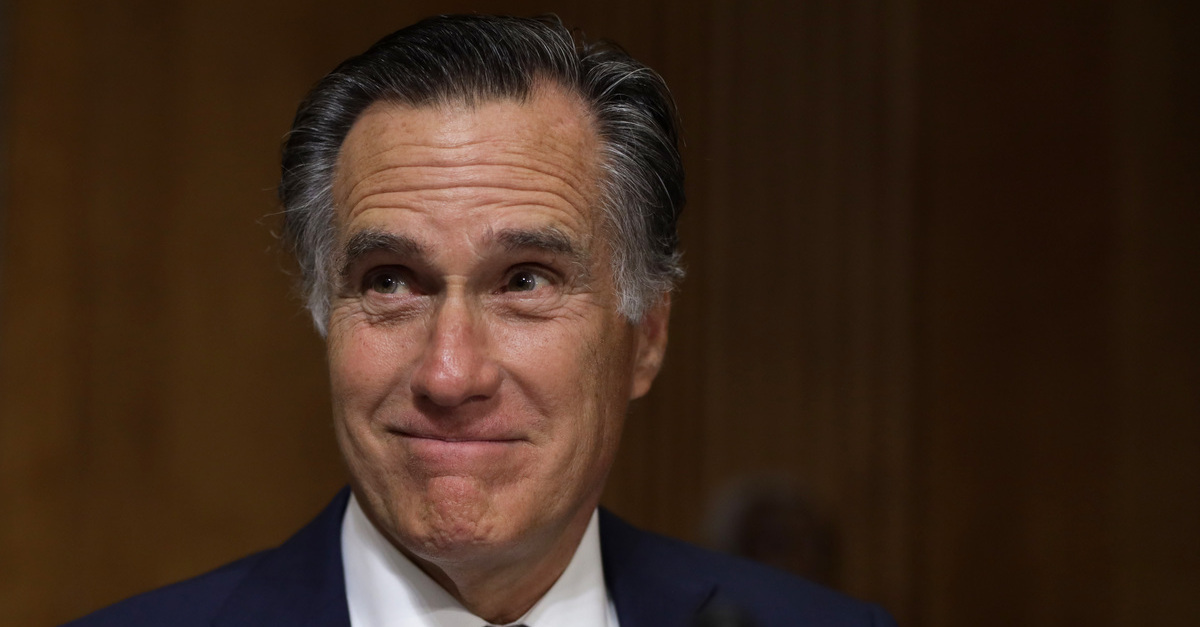
President Donald Trump’s commutation of Roger Stone’s prison sentence for lying to Congress, witness tampering and obstruction of justice was roundly rebuked on Friday evening and Saturday as corrupt and generally of a piece with the 45th president’s scandal-plagued administration.
Although a decidedly constitutional grant that cannot be legally questioned or limited by the Congress whatsoever, the pardon power, when a used by a president, is more or less a guaranteed source of strife, obloquy and consternation. It’s an instant headline-generator for both the wielder and those quick to harshly criticize its use. Context is key here because partisan disputes over the propriety of certain pardons are all but baked into the power’s use and are largely informed by the letter next to a president’s name.
The Stone commutation was no different in this respect but the White House’s late Friday action also elicited some scorn from some members of Trump’s own party–including Sen. Mitt Romney (R-Utah), a consistent critic and former fan of the president.
“Unprecedented, historic corruption,” the former GOP presidential candidate who auditioned for and scooped up Trump’s endorsement in 2012–at the height of Trump’s promotion of the racist anti-Barack Obama birther conspiracy theory–tweeted on Saturday, “an American president commutes the sentence of a person convicted by a jury of lying to shield that very president.”
The Utah senator’s claim that Stone’s commutation was “unprecedented” does not withstand scrutiny when considered alongside relatively recent presidential pardons, however, and Romney was quickly upbraided for this.
Law and policy expert Esha Krishnaswamy, who hosts a left-leaning podcast dedicated to historical accuracy, offered Romney some advice: “Someone please google Iran-Contra for this dude.”
The pile-on was swift and fierce, across various ideological lines.
“Romney stated that it is ‘unprecedented’ that ‘an American president commutes the sentence of a person convicted by a jury of lying to shield that very president,'” noted George Washington University Law Professor Jonathan Turley, the GOP’s expert witness during the House phase of Trump’s impeachment. “However, Romney has long heralded his respect and support of President George H.W. Bush despite Bush’s executive clemency actions for six former senior government officials implicated in the Iran-Contra scandal, including former Secretary of Defense Caspar Weinberger. Bush himself was implicated in that scandal and some alleged was protected by their silence.”
On Christmas Eve in 1992, George H.W. Bush pardoned former secretary of defense Caspar Weinberger as well as former Central Intelligence Agency (CIA) senior operations officer Duane Clarridge for multiple crimes they were alleged to have committed during the Iran-Contra affair. Weinberger was gifted clemency just before he was slated to go on trial for perjury and obstruction of justice. Clarridge’s pardon came in the midst of his trial for lying to Congress about an illegal missile shipment to Iran. Bush himself was believed to be implicated in the scheme–just as Trump is believed to be implicated now.
In another similar turn, Bush refused to provide investigators several relevant documents and notes–and was widely criticized for allegedly obstructing justice with this refusal and by using the pardons to create a clean sweep for the Iran-Contra defendants.
“The only difference is that Trump isn’t waiting till Christmas day to make sure that it doesn’t get picked up by news stations,” Krishnaswamy added.
While Weinberger and Clarridge were not convicted, four other high-profile conspirators were. The other officials pardoned by Bush who took part in the cover-up were: Elliott Abrams, Robert McFarlane, Clair George, Alan Fiers–all of whom were convicted over various crimes that resulted in the death of nearly 50,000 people due to the Contra terrorists illegally supported by the Reagan-era CIA.
Notably, it was Attorney General William Barr who advised Bush to issue the pardons.
The pardons were all-but universally considered a national disgrace and travesty of justice. Iran-Contra independent counsel and former Southern District of New York judge Lawrence Walsh described the blanket grants of clemency as “a sort of Saturday Night Massacre.”
Attorney and Intercept founder Glenn Greenwald also took issue with Romney’s historical revisionism–adding that Bush’s son, George W. Bush, actually did something similar as well.
“It’s not remotely ‘unprecedented,'” Greenwald said. “Bush 41 pardoned Defense Secretary Caspar Weinberger before trial in order to shield himself, while his son W commuted “Scooter” Libby‘s sentence for lying to FBI to protect [Karl Rove and Dick Cheney]. But we’re required to lie about history for The Cause.”
Others noted the contextual incongruity here as well.
“Why is this commutation worse than Scooter Libby’s, also on obstruction charges (though not witness tampering–Libby was too suave for that, also to protect the President (and VP)?” asked national security journalist Marcy Wheeler. “Or Weinberger’s?”
[image via Alex Wong/Getty Images]